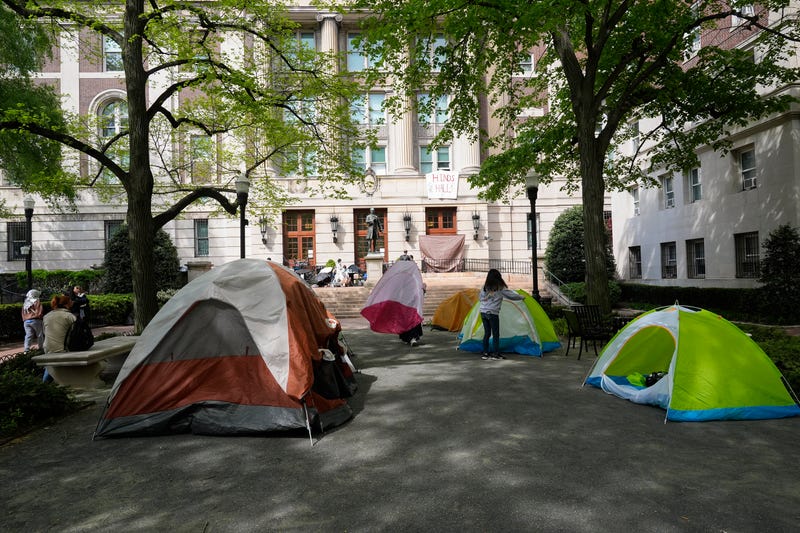
NEW YORK (1010 WINS/WCBS 880) – Confrontations between pro-Palestinian protesters and police continue on U.S. college campuses after an NYPD raid at Columbia University led to the arrest of about 300 individuals at both the Ivy League and City College of New York. These ongoing protests raise the question of where the line is drawn between protected free speech and illegal activity.
In the days that followed, police also arrested 15 protesters at Fordham University and made at least 56 arrests across two campuses in Greenwich Village, according to NYPD Chief of Patrol John Chell. Of these, 43 occurred at the New School and 13 at NYU.
"The first amendment guarantees the right to free speech and the right to peaceably assemble," Lindsie Rank, campus rights advocacy director with the nonpartisan Foundation for Individual Rights and Expression (FIRE) said in an interview with WCBS 880. "But there are limits to those freedoms, and those limits have certainly been tested in recent weeks."
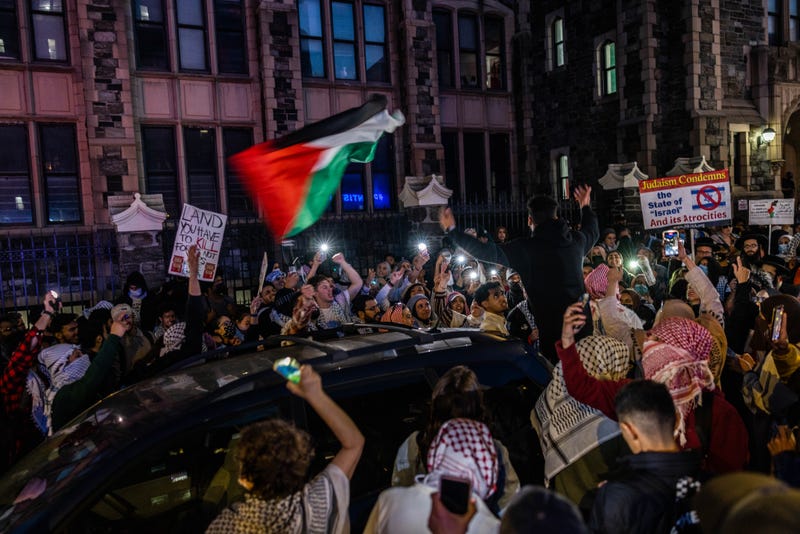
According to Rank, most speech is considered protected by the First Amendment, including "traditional forms of protest like taking to a park or a sidewalk and using your voice or even a sign to advocate for a position." However, there are two main categories of expressive activity that fall outside of First Amendment protection.
The first is "unprotected expression" such as true threats ("I'm going to kill you") or incitement. The second is activity that violates "reasonable time, place and manner restrictions" - rules that dictate the logistics of how expression can be carried out, like a policy prohibiting setting up tents on campus.
"These are just reasonable rules that dictate the time, the place or the manner that you can engage in expression," Rank said. "So something like a policy on a college campus that says no setting up tents on campus, that's probably reasonable because they want to make sure that folks are able to walk through the quad and various people are able to access those spaces, and tents can be an impediment to that."
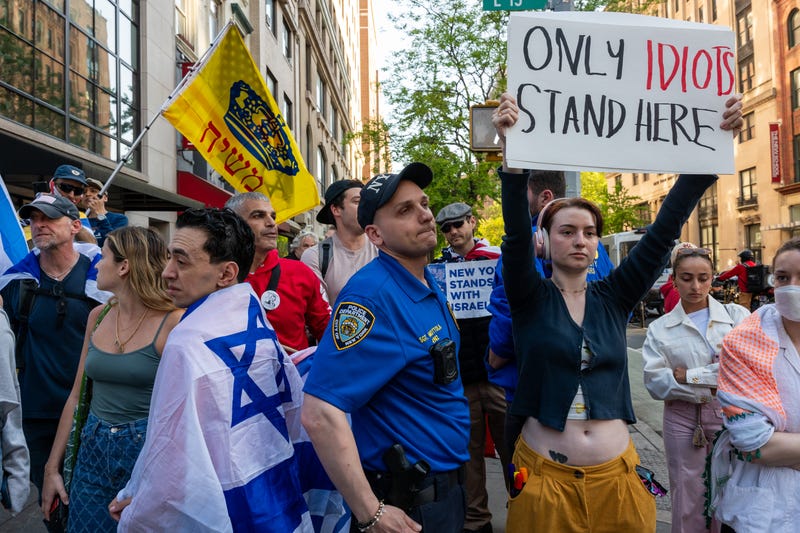
The rules are a bit different for public versus private universities. At public institutions, the First Amendment is "in full force" since they are government entities. But even private schools like Columbia University, which have policies guaranteeing free speech, have a "moral obligation and also in a lot of cases, a legal obligation to uphold those policies"
However, Rank stated that any illegal activity, such as "breaking and entering or assault," falls outside the protection of the First Amendment or a private university's free speech commitments. The recent videos of protesters smashing through doors and windows at Columbia would likely not be considered a peaceable expression, according to Rank.
"Anytime you're talking about something that falls into a criminal activity, that's going to be conduct that falls outside the protection of the First Amendment or these free speech commitments that private institutions like Columbia often have," Rank said. "Certainly things like breaking windows is probably, in most cases, not going to be protected."
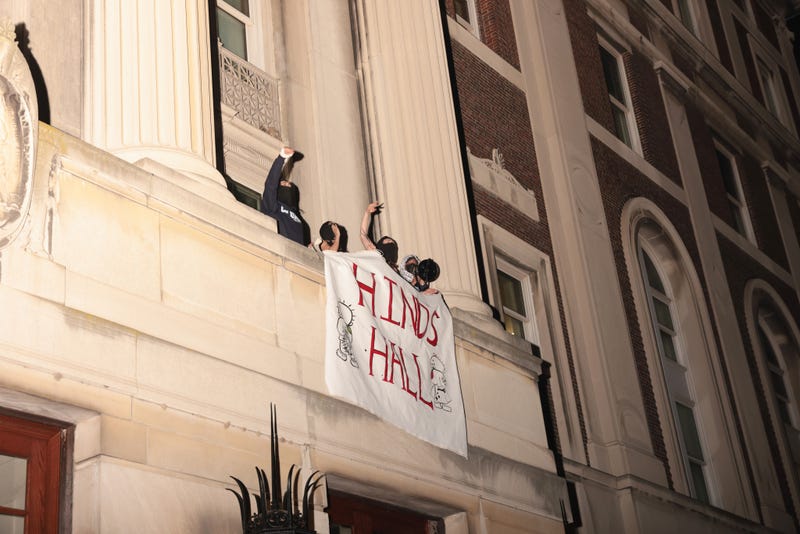
Rank emphasized the importance of upholding the principles of free speech while also maintaining reasonable rules and boundaries to ensure the safety and accessibility of campus spaces.
As of Friday, more than 2,200 protesters have been arrested at college campuses nationwide.
President Joe Biden on Thursday rejected calls from student protesters to change his approach to the war in Gaza while insisting that “order must prevail” as college campuses across the country face a wave of violence, outrage and fear.
“Dissent is essential for democracy,” Biden said at the White House. “But dissent must never lead to disorder.
“There’s the right to protest, but not the right to cause chaos,” Biden said shortly before leaving the White House for a trip to North Carolina. “People have the right to get an education, the right to get a degree, the right to walk across campus safely without fear of being attacked.”
Instances of hatred among the antiwar protests have rattled many Jewish students, regardless of how they feel about Israel’s government or its treatment of Palestinians. Some examples from campus protests that stung: A poster depicting the Star of David crossed out in red. “Death to Israel” scrawled in spray paint. Chants of “We are Hamas.”
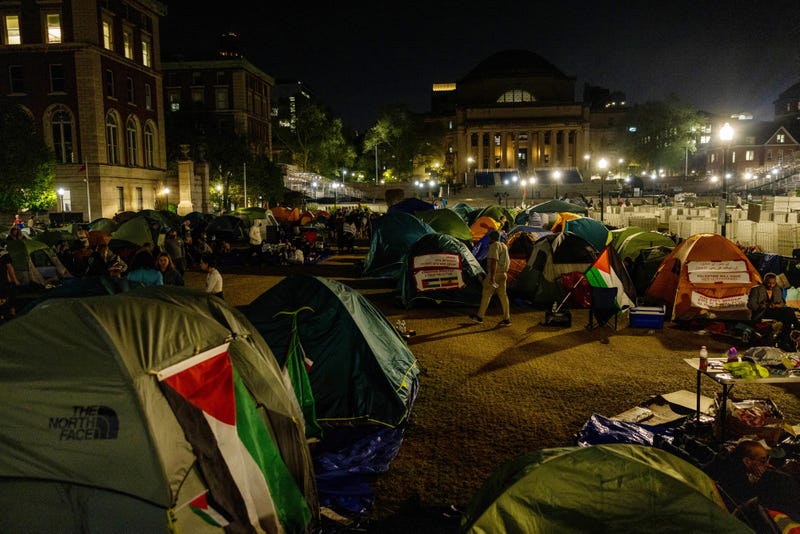
Columbia University confirmed that the university banned student Khymani James, one of the encampment leaders, from Columbia after a clip from an Instagram live in January shows James saying that “Zionists don’t deserve to live” and that people should ““Be grateful that [he is not] just going out and murdering Zionists.”
“Chants, signs, taunts, and social media posts from our own students that mock and threaten to ‘kill’ Jewish people are totally unacceptable,” Columbia’s statement read. “We can report that one individual whose vile videos have surfaced in recent days is now banned from campus.”
In a statement released by Columbia University Apartheid Divest, the organization that planned and is maintaining the encampment, James apologized for what he said and asserted that he “[affirms] the sanctity of all life” and that “all people deserve to be safe from physical harm.”
“I am frustrated that words I said in an Instagram Live video have become a distraction from the movement for Palestinian liberation. I misspoke in the heat of the moment, for which I apologize,” James said.
There have also been incidents against Palestinian students on college campuses. The Education Department launched a civil rights investigation into Columbia University following a complaint from Palestinian students represented by Palestine Legal, alleging discrimination and retaliation in violation of Title VI.
The complaint includes accusations of severe anti-Palestinian, anti-Arab, and Islamophobic harassment by university administrators, as well as threats and doxxing directed at students. It also claims Columbia has failed to address these issues adequately, instead exacerbating a hostile environment by suspending the Students for Justice in Palestine organization and treating Palestinian students and their allies differently.
The Associated Press contributed to this report.
